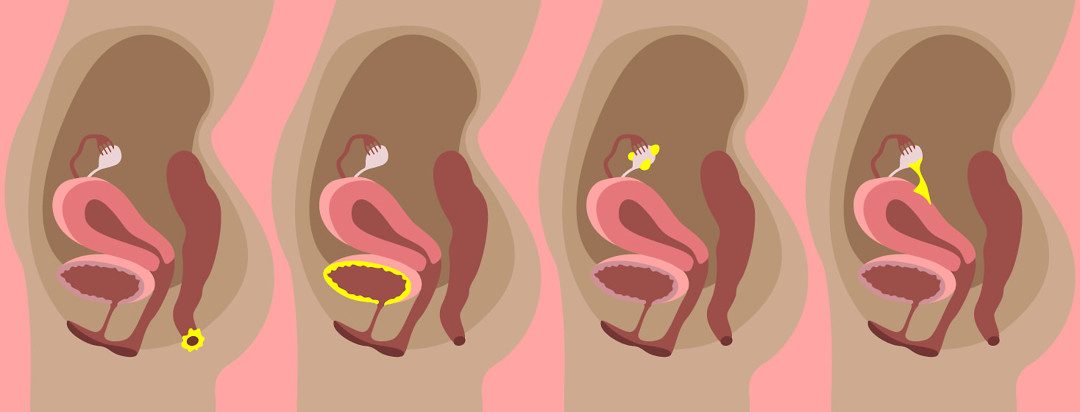Dealing with The Complications of Endometriosis
When battling endometriosis, it’s common to develop additional complications. These complications can be related to the reproductive system, or can extend further throughout the body.
In order to get a better sense of life with endometriosis, we conducted our 2018 Endometriosis In America Survey. Over 1,200 individuals with endometriosis or endometriosis-related symptoms participated in the survey, which addressed topics such as diagnosis, quality of life, relationships, treatment experiences, and symptom management. Over 95% of respondents reported experiencing complications associated with endometriosis, including the following:
Bladder and/or bowel problems
In addition to their endometriosis, over 70% of respondents reported experiencing bladder and/or bowel problems. These issues take on many forms, such as burning while urinating, having an increased need to urinate, losing the ability to control the bladder, and experiencing abdominal pain, constipation, diarrhea, pain or straining while trying to have a bowel movement. These issues may be related to endometriosis, or could be due to another underlying issue such as IBS. These bladder and/or bowel problems may be due to endometriosis lesions or adhesions (bands of scar tissue) growing on the bladder or bowel and impairing their function. These also may be caused by the constant inflammation in the pelvic area caused by endometriosis.1
Endometriomas (ovarian cysts)
Nearly 65% of respondents reported experiencing endometriomas. Endometriomas, also called ovarian cysts or chocolate cysts, are cysts that are filled with old blood and have endometriosis on their walls. These cysts can grow or rupture. In some cases, they may impact a woman’s fertility.2
Adhesions
Over 50% of respondents reported experiencing adhesions. Adhesions are bands of scar tissue that develop as a result of endometriosis. The endometriosis-like tissue that is present in the pelvis thickens and breaks down, however, unlike for actual endometrial tissue inside the uterus, there is no place for the blood and tissue to escape. This can cause a development of scar tissue, which can continue to grow into adhesions. Adhesions can cause abdominal pain and bladder and bowel issues, as well as impact fertility.
Infertility and pregnancy complications
Roughly 46% of respondents reported experiencing difficulties in becoming pregnant, and nearly 30% reported pregnancy complications while battling their endometriosis. Pregnancy complications reported included miscarriage, placenta previa (where the placenta covers the cervix during birth), preterm births, undergoing a C-section, and ectopic pregnancy, among other possible complications. Although endometriosis growths may impact a woman’s fertility and have the potential to cause problems during pregnancy, it is important to note that not all women with endometriosis will have difficulties with becoming pregnant and having a healthy pregnancy. If you have endometriosis and are trying to conceive, contact your healthcare provider for more information.
Interstitial cystitis (painful bladder syndrome)
Interstitial cystitis was reported by nearly 40% of survey respondents. Interstitial cystitis is also called painful bladder syndrome, and often causes a sense of pressure in the bladder, as well as bladder pain and pelvic pain, among other symptoms. Although the exact cause of interstitial cystitis is unknown, it has been found to regularly occur in women with endometriosis.3
Anemia
Of survey respondents, 36% reported having anemia with their endometriosis. Anemia is a condition in which the body does not have enough red blood cells to carry hemoglobin (a protein rich in iron) throughout the body. It’s also possible that enough red blood cells are present in the body, however, they are not functioning in the way they should. Common signs of anemia include weakness, dizziness, headache, cold hands or feet, chest pain, and shortness of breath, among other symptoms.4 If you are experiencing any of these symptoms or think you may have anemia, consult your healthcare provider so they can determine your anemia status, and the specific cause.
Other complications
Over 10% of respondents reported that they experience other complications related to their endometriosis. Some of these complications include:
- Ulcers
- Migraines
- Ruptured cysts
- Polycystic ovary syndrome (PCOS)
- IBS
- Fibroids
- Depression
If you are experiencing any of the complications listed above, consider contacting your healthcare provider to learn more.

Join the conversation